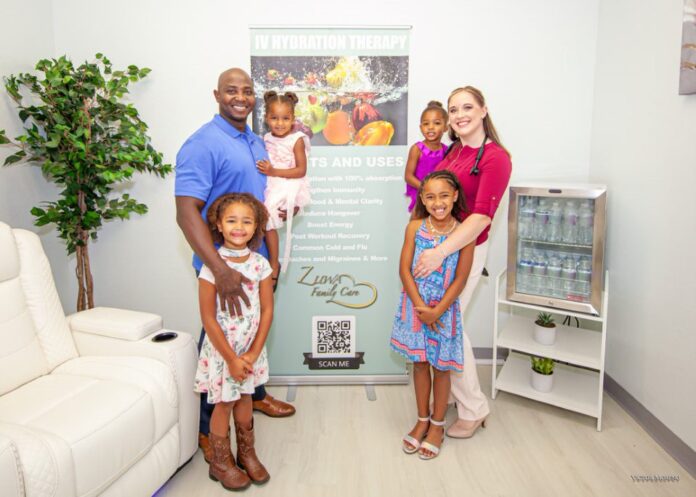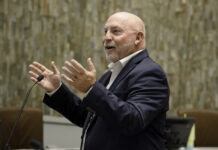
An ounce of prevention is worth a pound of cure.
Ben Franklin’s bit of wisdom seems to be a guiding principle for Ashley Hanners, the provider at Zuwa Family Care, an integrative medical practice in Maricopa.
Both Hanners and her husband, Sam Oviawe, who opened their practice in August in the Shops at Maricopa Village, have extensive health care experience. While earning her degree as a certified family nurse practitioner, she was an ER nurse at Chandler Medical Center. He ran several different divisions for nursing and rehabilitative care centers.
Hanners grew up in Oregon, while Oviawe was born in Nigeria. They met working as nurses for the same Arizona-based home health company.
The couple has a desire to not only treat illnesses, but to work with patients to prevent the occurrence of problems in the first place.
DEFINING INTEGRATIVE MEDICINE
The Andrew Weil Center for Integrative Medicine at the University of Arizona describes integrative medicine as “healing-oriented medicine that takes account of the whole person, including all aspects of lifestyle. It emphasizes the therapeutic relationship between practitioner and patient and is formed by evidence and makes use of all appropriate therapies.”
In a sense, it’s an approach combining the best of advanced medical treatments and holistic medicine. While Western medicine is practiced, there’s an emphasis on finding the root cause of an ailment, instead of focusing just on the symptoms.
Hanners said a driving force in her desire to open a practice was to find the cause and cure of illnesses and ailments, instead of managing them.
“You don’t learn a lot about preventative medicine while you are in school,” Hanners said. “There is definitely a flaw, in my opinion, in our health care system, where we focus very much on a disease process and what medications we can give for that process. There’s not a lot taught on the underlying cause and how we treat that underlying cause.”
Still, Hanners is quick to point out that modern medicine is a blessing.
“I’ve worked in an emergency room where many lives have been saved by Western medicine,” Hanners said. “But what I also saw were patients who would come in with several comorbidities. They are on medications to counteract the side effects from the other medications they were on.”
There’s not enough of a focus on educating patients – not enough of a proactive approach to health care, according to Hanners. In effect, it’s sometimes waiting for bad things to happen before any action occurs.
“We are managing, instead of treating the disease process,” she added. “I felt like there had to be a better option. People didn’t know why they were taking all of the medications they were on.”
FORGING A DIFFERENT PATH
As a unit manager for a team of nurses at a large facility in Scottsdale, Oviawe gained a lot of valuable experience in the field. While successful, he longed for a situation where he could make more of an impact.
“When you work for someone else, you don’t always have a lot of control,” he said. “The good thing about our situation now is that we can focus our decisions on how to provide the best health care for the citizens of Maricopa and anyone who comes to our practice.”
Oviawe pointed out that with ownership of their practice, he and Hanners get to hone in on what they find to be most important.
“We’re in the position to do things the right way, the holistic way,” he said. “Not just to make profit, but to make an impact in that person’s life.”
The best way to have that impact is taking time to listen to patients and to become personally invested in their health and wellbeing.
“I’m excited that we have time to answer their questions, encourage and point them in the direction they need to go,” Oviawe said. “One of the greatest satisfactions is when someone in the community who we have helped tells someone else, ‘Try this, I did it and it’s working for me.’”
ENHANCING CARE
At Zuwa, even a basic medical test is being enhanced to elevate care.
At most practices, a patient’s bloodwork — and its levels of cholesterol, glucose, vitamin D, testosterone and estrogen, for example – are graded on a pass/fail basis. There’s a reference point for each value. A patient is considered fine if the levels fall within accepted levels, until one day, your levels fall out of the prescribed range.
Such a process feels counterintuitive to Hanners.
“Do you wait until you fail an exam to study for it?” She asked. “It seems like a silly question to ask. People study before they take the exam. Why in health care are we waiting for patients to fail in order to do anything about the symptoms they are experiencing?
“Just because you are not failing, it doesn’t mean that you are necessarily doing well.”
Instead, Hanners grades bloodwork on an A-B-C-D scale and works with patients to improve any C or D levels.
Hanners’ approach can identify potential issues with patients’ health before they become problems. She looks for imbalances in hormones like testosterone and estrogen, which can show up in unexpected places.
“People think that testosterone levels are just a concern for men,” Hanners said. “But women need it also and can have problems there, too. And the same for men with estrogen.”
If patients need hormone therapy replacement, Zuwa has the treatment available on site.
NEW PAIN TREATMENT
For people experiencing pain that isn’t responding to therapy or other modes of pain management, there may be an answer.
Zuwa offers perineural injection therapy, a series of injections of an alkaline dextrose solution just under the skin that offers relief to superficial nerves, which in turn communicate with deeper nerves and muscles. Dextrose is a naturally occurring glucose that feeds and hydrates the injured nerves, providing an environment for nerves to heal themselves.
Brian French said he has benefited greatly from the therapy at Zuwa. He broke his foot while coaching a soccer match, sustaining serious nerve damage.
“I’ve had this foot injury for the last five years,” French said. “I’ve had multiple operations and been to doctor after doctor and haven’t been able to get any relief.”
French, an active young man of 42, said the injury had slowed him down to the point where he’d gained nearly 60 pounds. After getting the treatment in August, he’s been able to return to a physically active lifestyle and lose nearly 20 pounds.
“It’s made a real difference in my life,” he said.
The treatment isn’t covered by his insurance, but French said he gladly pays for it out of pocket.
Kristan Boardman, another Zuwa patient, had similar results.
A pinched nerve in her lower back was so painful she found it difficult to stand or walk. She tried adjustments by a chiropractor and massages and took Tylenol in an attempt to alleviate the pain.
“Nothing was really working,” she said
Boardman said she underwent the treatment of about 20 injections and despite some tenderness at the injection site, the results were impressive.
“It wasn’t 100%, but I felt relief immediately,” she said. “At first, I would say that it cut my pain in half, and a week later, I felt no pain. It was awesome.”
In the second week of September, the practice put up a sign to let people know it was open for business. In the six weeks before the sign went up, however, the practice had amassed 140 patients through word of mouth, Hanners said.
“Once we launched, it’s been nonstop,” Oviawe said. “The community has been supportive. The people who come, seem to tell their friends, their neighbors and spouses about the services we have to offer.”
This story was previously published in the October edition of InMaricopa Magazine.






![MHS G.O.A.T. a ‘rookie sleeper’ in NFL draft Arizona Wildcats wide receiver Jacob Cowing speaks to the press after a practice Aug. 11, 2023. [Bryan Mordt]](https://www.inmaricopa.com/wp-content/uploads/2024/04/cowing-overlay-3-218x150.png)





![Alleged car thief released without charges Phoenix police stop a stolen vehicle on April 20, 2024. [Facebook]](https://www.inmaricopa.com/wp-content/uploads/2024/04/IMG_5040-218x150.jpg)




